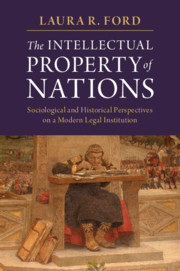 The Intellectual Property of Nations
The Intellectual Property of Nations Christianizing Legal Power
Published online by Cambridge University Press: 04 June 2021
This chapter traces the deveopment of Christianity within the late Roman empire, opening with an imperial decree that institutionalized Christianity as the official law of the empire. We examine the close counterparts to intellectual property that existed in the Roman law of late antiquity. With Christianization, however, we also see how semantic formalities and substantive rationalities in Roman law were culturally transformed. Empirical formalities from Roman law persisted, but these were sacramentalized in accordance with Christian understandings. The emphasis on God's creation within Christianity was combined with Hellenistic Roman traditions celebrating wondrous discoveries. Instruments of legal power from the Roman empire were carried forward, but the transformations that took place with Christianization would mean that these instruments of legal power could be deployed in newly intentional ways. In this chapter, we witness the rise of a distinctive order of obligation, one involving faith in legality. This is an order of obligation that combines a deep confidence in the ordering powers of law with tendencies toward acquisitiveness in matters of property and wealth.
To save this book to your Kindle, first ensure [email protected] is added to your Approved Personal Document E-mail List under your Personal Document Settings on the Manage Your Content and Devices page of your Amazon account. Then enter the ‘name’ part of your Kindle email address below. Find out more about saving to your Kindle.
Note you can select to save to either the @free.kindle.com or @kindle.com variations. ‘@free.kindle.com’ emails are free but can only be saved to your device when it is connected to wi-fi. ‘@kindle.com’ emails can be delivered even when you are not connected to wi-fi, but note that service fees apply.
Find out more about the Kindle Personal Document Service.
To save content items to your account, please confirm that you agree to abide by our usage policies. If this is the first time you use this feature, you will be asked to authorise Cambridge Core to connect with your account. Find out more about saving content to Dropbox.
To save content items to your account, please confirm that you agree to abide by our usage policies. If this is the first time you use this feature, you will be asked to authorise Cambridge Core to connect with your account. Find out more about saving content to Google Drive.